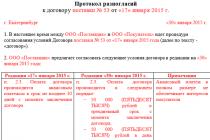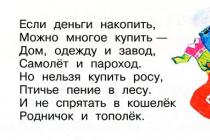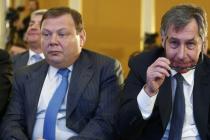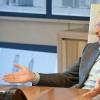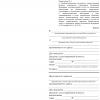These immutable "laws of value" boiled down to the following:
1) The cost of a thing is temporary (market) and permanent (natural). The latter is the center around which the former oscillates and aspires.
2) Market value determined by supply and demand. In this demand turn depends on the market value.
3) Natural value is defined differently for non-reproducible and freely (in any quantities) reproducible goods. In the first case (this also includes monopoly situations), it depends on the rarity of the thing, in the second (predominant) one, on the magnitude of the costs of producing the product and its delivery to the market.
4) Production costs consist of wages and profits on capital and are ultimately determined by the amount of labor expended.
Thus, in the classical model, the average price level (natural value) is determined in the sphere of production and is set by costs. The supply of a commodity is determined by the demand that exists at a given price.
It must be said that on the European continent the theory of value existed in a slightly different form. On the one hand, there was a strong tradition going back to Galiani-Condillac-Sack) and linking the value of a thing with its usefulness. On the other hand, German economic literature, influenced by the powerful German philosophy of the time, paid much attention to the meaning of the word "value" (Wort) itself, correlated it with other human values, and so on. At the same time, theories of value on the continent usually included the "laws" described by Mill, although this, as a rule, led to contradictions. But the classical theory itself in its Millevian version was not free from shortcomings. First, for any, even the most highly developed and wealthy society (and perhaps for it in particular), the possibility of an unlimited increase in production, from which the theory of costs proceeds, is the exception rather than the rule. Secondly, the objective theory treated the demand for goods as a "black box". What little was said about the determinants of it came down to a trite logical circle: demand affects prices, and prices affect demand. Thirdly, the dualism of the classical theory of value (completely different explanations for freely reproducible and non-reproducible goods) haunted scientists seeking to create a coherent and comprehensive theory that reveals the essence of value / cost. (And precisely such goals were set for any science in those pre-positivist times.)
Marginalists have attempted to construct a monistic general theory of value from premises quite opposite to those of the classical school.
As the initial elementary phenomenon of economic life, they chose the relation of a person to a thing, which manifests itself in the field of personal consumption and exchange. If for the classical school the essence of exchange should be sought in the sphere of production, then for marginalists, on the contrary, production itself is a kind of indirect type of exchange, and the latter, in turn, is dictated by the needs of consumption.
Thus, at the core economic theory marginalists inevitably had to lie one or another model of a rational consumer. (A change in the task facing the theory requires a revision of the human model.) It turned out that the model of J. Bentham, familiar to us, is well suited for these purposes. However, marginalists have made some significant additions to Bentham's concept of human nature.
The goal of exchange and production for each of their participants for marginalists remains to obtain maximum pleasure or the greatest satisfaction of needs. However, this motivation, inherent in the Bentham model, is supplemented by the so-called Gossen's 1st law: the pleasure received by an individual from a unit of good (utility) decreases with an increase in the number of these units at his disposal. In other words, all needs tend to be satiated. Marginalists considered this fundamental fact an obvious property of human nature, and Jevons, defending it, also referred to the results of psychological experiments.
The application of the law of diminishing utility allowed marginalists (Jevons and Walras) to improve the counting apparatus of their economic entity. Since the useful return from each successive unit of the good falls, and the troubles associated with obtaining it increase (whether it is the cost of labor in production or the loss of other goods in the exchange), a moment must inevitably come when a further increase in goods will give not an increase in pleasures, but their reduction. Such a situation can be perfectly described in terms of differential calculus (optimization problem).
The maximum value of any non-linear function (profit or utility) can, as is known, be achieved only if its first derivative is equal to zero. If we find economic equivalents to mathematical terms, this means that in the case of profit maximization, the price is equal to marginal costs, and in the case of utility in exchange, the marginal utilities of goods are proportional to their prices (Jevons). The influence of mathematical tools on the formulation of the theory of marginal utility by Jevons and especially by Walras is obvious and recognized by them. The main properties of an economic subject among marginalists are chosen in such a way as to provide an unambiguous solution to the problem of maximizing utility. It is possible to get the only value of the argument at which the function reaches its maximum only if the utility function is non-linear, and this convenient form of the function is just given by the law of diminishing utility.
The marginalist person is engaged in utility maximization not only within the framework of satisfying a given need, but also choosing between satisfaction different needs(and Gossen's law).
Thus the rational utility maximizer, who became the protagonist of marginalist economics, is the rightful heir to Bentham's hedonist, enriched by the arsenal of calculus.
However, the application of the differential calculus to the theory of value requires the researcher to make some additional technical assumptions. First, the valued good must be infinitely divisible, or, equivalently, the utility function must be continuous, not discrete. Second, this function must be differentiable, i.e. have a tangent at every point, and thirdly, be convex so that the derivative at every point is finite.
All three additional conditions are introduced for the convenience of calculation and narrow down the range of phenomena explained by the marginalist theory. And the property of infinite divisibility is so uncharacteristic of most goods that Jevons and Marshall have to make a reservation according to which the utility function and, in general, their economic theory refers rather not to one subject, but to a large set of them, for example, to the inhabitants of Liverpool or Manchester. But after all, for the totality of consumers, in theory, subjective assessments and preferences lose their meaning.
"Fundamental laws" based on the model of an economic subject, which can describe the "average" behavior of large masses of people, the researcher can derive only through intuitive knowledge, introspection.
The utility-maximizing human model allowed us to represent the economy in equilibrium, i.e. in a stable, optimal state (sustainable precisely because it is optimal for all participants - they have no incentive to strive to change the existing situation). This approach assumes an extremely abstract view of the economic subject. The deepening of abstractness goes along two lines: the subject becomes simpler, from the point of view of motivation (all its characteristics are cut off, except for the pleasures and sufferings associated with certain benefits, including, of course, class and national certainty; the stability of the system of individual preferences and its independence are assumed from external influences) and more rational (it must always be able to reach the optimum, otherwise its state, and hence the state of the entire economy, will not be in equilibrium).
The equilibrium approach and the corresponding mathematical tools had a particularly strong effect on the information and intellectual characteristics of the economic subject.
The assumption of an equilibrium, optimal state as a result of human choice implies that the subject must have accurate knowledge of at least all the alternatives available to him. In the case of expanding the theory to a system of general equilibrium (Walras), more extensive information about the state of the economy as a whole is also needed, which Walras introduces through the premise of a general auction, where the "groping" of tatonnement takes place).
This knowledge does not have to be expressed in any specific numbers that characterize the usefulness of different alternatives. Jevons emphasizes that he "does not insist that the human mind can accurately measure, add, and subtract sensations in order to find out their exact ratio. Moreover, there can be no question of comparing the sensations of different people. The only way to find out which human sensation is greater , and which is less, is to observe his real choice (an approach that anticipates Samuelson's theory of "revealed preferences") However, one way or another, consciously or subconsciously, but knowledge must be present.
The static nature of marginal equilibrium analysis is expressed in the fact that, as a rule, it does not consider (or considers in special sections not directly related to the main theory) processes occurring in real time. The future, its uncertainty, the process of obtaining information by an economic entity for marginalists do not exist as real phenomena. But in order to make an optimal decision, an accurate forecast of how any of the possible behaviors will end is necessary. Thus, "perfect foresight" also falls into the properties of a marginal economic subject. From the same "timelessness" follows the premise of an instant reaction to any changes in external parameters: any change in the equilibrium conditions in the marginal theory occurs discretely, like switching television programs, without any adaptation process.
The reader has probably already noticed that, speaking of the model of man among the first marginalists, we always refer to only two of the three founding fathers: Jevons and Walras (moreover, if Jevons actively developed the Bentham model of man, then Walras, who did not love Bentham and utilitarianism, approached it as a purely mathematical concept) and we do not mention Menger at all. This is far from accidental. Menger's theory and the traditions of the Austrian school arising from it political economy really have a lot of originality.
What are characteristics Austrian school of political economy? First of all, it is consistent, monistic subjectivism. All categories of economic science, the Austrians, unlike other areas of marginalism, seek to derive only from the attitude of the individual to the thing, his preferences, expectations, knowledge. As K. Menger insistently emphasizes over and over again, any benefits, in themselves, from the point of view of an economist, are devoid of any objective properties, and above all, value. These properties are imparted to them only by the corresponding relation of this or that subject.
Thus, the essence of interest for the Austrians is in a different assessment of present and future goods, the costs of production (unlike, for example, from Marshall) - in the lost benefit that productive goods could bring if they were not used as they really are. , otherwise, etc. At the same time, the subject among the Austrians is not guaranteed against mistakes - he can, for example, incorrectly assess his future needs and the means of satisfying them - and these mistakes of his will not be "rejected" by the market, but will play their role along with more correct estimates in determining the price of a given good.
The special emphasis that the Austrians place on the uncertainty of the future and the possibility of errors, the great importance attached by them, especially Menger, to the knowledge of the economic subject, the information at his disposal, sharply distinguish them from other marginalists and make their theories especially important in our days, when the problem of searching and processing information is at the forefront of economic research.
It can be safely asserted that the degree of rationality required from an economic entity is an order of magnitude lower in the theories of the Austrians than in the models of Jevons and Walras. This is manifested, in particular, in another feature of the Austrian school, namely, that the Austrians do not use not only mathematical methods of research, but even geometric illustrations of their theoretical positions (like Walras, Jevons and Marshall). This feature of the Austrian school is striking to everyone; you will not find in their books not only differential equations, but also the usual diagrams with supply and demand curves. Of course, this can also be explained by the fact that the founders of the Austrian school, who received a law degree, simply did not master the technique of mathematical analysis. However, the main reason is completely different. The point is not only that, for the convenience of analysis, the utility function must have (as mentioned above) certain, not very realistic properties.
The mathematical version of the theory of marginal utility assumes that an economic entity unerringly finds the best option for itself, and this contradicts the aforementioned provisions of the Austrians (primarily Menger) about uncertainty and errors. Therefore, ignoring mathematical analysis by the Austrians allows them not only to cover a wider range of phenomena with their theory, but also to preserve its consistency and remain within the framework of a somewhat more realistic model of human behavior.
Here we come to the next distinguishing feature Austrian school - methodological individualism. The Austrians (with the exception of the same Menger) considered and solved all economic problems at the micro level, at the level of the individual. They did not and do not recognize specific macroeconomic phenomena that cannot be reduced to a simple resultant of individual preferences and decisions. From our point of view, the latter is explained by the desire of the Austrians to reveal the essence of phenomena and cause-and-effect relationships, and, consequently, their distrust of functional dependencies.
In connection with methodological individualism, there is also a remarkable absence of developed ideas of equilibrium in the works of the Austrian marginalists. It is clear that the Walrasian concept of general equilibrium was too supra-individual for the Austrians, requiring excessive rationality and optimality of solutions. It is much more interesting that the concepts of partial equilibrium and the only equilibrium price (the price is set at some random point of the equilibrium interval) were not built into Menger's theory either.
The factor of time plays an important role in the Austrian theory. Less than everyone else. marginalist Austrians deserved the reproach of a purely static point of view. They did not forget to emphasize that people's value judgments directly depend on the period of time for which they can calculate the satisfaction of their needs (the period of foresight). It is the time factor and the uncertainty associated with it that lead to the errors of the participants in the exchange and do not allow the general equilibrium to be established, with the existing timeless Walrasian system, where all prices and quantities of goods are determined simultaneously.
In addition, Menger, unlike Jevons, does not directly link his theory of value with the hedonistic interpretation of human nature and does not use the term "utility" at all (as his followers Böhm-Bawerk and Wieser did). He is talking only about the satisfaction of needs and the relative importance of the latter.
In conclusion, it should be said that with all the undoubted differences between the Menger line and the Jevons-Walras line, we can draw one indisputable conclusion: in the works of the marginalists, a new model of a person, a rational wealth maximizer, received citizenship rights (the word maximizer does not necessarily mean here maximization in terms of differential calculus) . The main innovation in comparison with the concept of "economic man" of the classical school here is not so much a change in the characteristics of the economic subject as a change in the place of behavioral prerequisites in economic analysis. In the theoretical systems of Smith and especially Ricardo, the concept of "economic man" was basically the general methodological principle of research, which was fixed by J. S. Mill. In the economic analysis of the market mechanism itself, this premise, in fact, was not actively used, remaining "behind the scenes" and not worthy of independent study.
A completely different position is occupied by the concept of "economic subject" in the theory of marginal utility. The properties of the "optimizer person" are of paramount importance in the marginalist theory of value, which has taken the form of "consumer choice theory". The concept of "economic subject" here becomes "working", operational, outgrowing the role of the "general methodological assumption" .
2. The principle of rationality of the activity of "economic man"
3. The principle of alternative choice
4. Increment principle limit values
5. The principle of equilibrium analysis
Bibliographic list
1. The principle of limited resources
Economic theory describes and systematizes knowledge about economic processes and phenomena, reveals the essence economic laws, patterns and trends. Economic theory acts, on the one hand, as an "intellectual toolkit" for other economic sciences, on the other hand, it contributes to the formation of a "thinking technique" of economic entities.
Like any science, economic theory is based on a certain set of principles, that is, restrictions that allow you to set the scope of the study, highlight the originality of the subject and object of study. These principles are a kind of "rules" that provide the logic of economic thinking, reflecting the basic "beginnings" of solving economic problems.
The principles of economic theory were formed in the process of formation of economic theory as a science. In the hierarchy of principles of economic theory the principle of limited goods (resources) is primary. It is the scarcity of resources, both non-economic and economic, that forces economic actors to act rationally. In the absence of this principle, there would be no need for economic analysis, calculations, planning and forecasting. Humanity has already crossed the stage of primitiveness, in which human needs were so small, and nature is so rich that gathering and hunting served as the main sources of satisfaction of these needs, the division of labor was natural, there was no need for commodity production and commodity-money relations, and "limited resources” gave way to “limited needs”. Scientific and technological progress has not yet reached those heights that would help mankind to expand the possibilities of consumption. The essence of the principle of scarcity of resources, or the principle of rarity, is to state that all the resources that a person uses, all the benefits that he creates, cannot be freely reproduced or produced in any required quantities in certain period time to achieve the many goals that people set for themselves. "Economic Man" finds himself at the mercy of harsh reality. And the first thing he has to do is to rank, limit or transform his needs. The second is to realize your responsibility for the consumption, production and distribution of resources. Material (things, objects, etc.) and ideal phenomena (the glory of the commander according to Zh.B. Seyu), ways of changing and moving things in space and time, energy in various forms, all kinds of information can be considered as a blessing. All of the above turns into a blessing due to utility, a property realized by a person as a means of satisfying his needs. Non-economic good is given to man by nature (air, sunlight, moonlight). An economic good is primarily a product of labor created by subjects economic activity in limited quantities. Secondly, an economic good becomes when its possession is connected with the refusal of the possession of another good. An economic good implies some kind of payment for it. Land becomes an economic good if labor is invested in its cultivation, if the subject spends other benefits in order to use the useful properties of the land.
In economic theory, full or partial ownership of another good is considered as a good. For example, the right to sell, exchange for a more useful good, transfer it for use on a reimbursable basis is a good that characterizes a market economy. The classification of goods is rather complicated. Let us single out some types of goods that, one way or another, reflect the problem of their scarcity or rarity.
To consumer Goods include goods and services that are bought by the consumer for their direct use. In order to study the dynamics of needs in more detail, statistics divide consumer goods into three main groups: food products (foodstuffs), manufactured goods (shoes, clothing, dishes, etc.), high-quality durable goods ( Appliances, cars, etc.). According to Engel's law, the higher the standard of living of people, the relatively less their costs for the purchase of food products and the more for the purchase of industrial goods. With a further increase in the standard of living, the demand for high-quality durable goods and the relative share of the costs of their purchase in the budgets of consumers begin to grow.
Production, or indirect goods, are goods that are used in the production of other goods. These are raw materials, machines, machines, buildings, professional skills, qualifications, etc. We remind you that production goods in economic theory are usually called resources, or factors of production. These include labor, land, capital, entrepreneurship. These factors are the main integrated elements of the economic potential of a country. The production possibilities of society have always been limited. With an increase in the population, it became necessary to involve new lands in the economic circulation, a variety of natural resources. Until the beginning of the 20th century, the growth rate of the resources used remained relatively small. This was explained, on the one hand, by a certain stability in the needs of the population, and, on the other hand, by the limited growth of the population itself. Two thousand years ago, 230-250 million people lived on Earth, in 1800 - a little more than 900 million, in 1900 - 1.5 billion, in 1960 - about 3 billion, in 1995 - 5.5 billion people. The rate of population growth in the twentieth century. increased sharply, although at the very end of the XVIII century. The young English priest Thomas Robert Malthus developed the law of diminishing returns. According to this law, food will increase in arithmetic progression, and the population - in geometric progression. In connection with what happened population explosion at the level of the world community over the past forty-fifty years, as many natural resources have been involved in the economic turnover as they have been used in the entire history of the development of civilization up to that time. Justification of the choice of the use of limited resources has become one of the central problems of management. Manufacturing directly affects human needs in several ways. On the one hand, production creates specific goods and thereby contributes to the satisfaction of certain needs. The satisfaction of certain needs, in turn, leads to the emergence of new requests. On the other hand, production influences the ways in which useful things are used and thus forms a certain household culture. In its turn economic needs have a negative impact on production. Thus, needs are a prerequisite, an internal motivating force and a specific guideline for creative activity; they are inherent in changing both quantitatively and qualitatively.
The socio-economic progress of society is manifested in action the law of the rise of needs: with the development of production and culture, an objective need for growth, an increase in the number and improvement of human needs is manifested. The rise of needs does not consist in a simple proportional growth of all kinds of needs. Fastest to saturate and have certain limit development needs of a lower order - physiological needs. On the contrary, the demands of a higher order are boundless - social, intellectual, spiritual. In a market economy, it is relevant to divide goods into private, general and public, which differ depending on accessibility (ownership, ownership) and the nature of use.
In economic theory, two mixed types of goods are distinguished depending on the availability and nature of consumption. This shared resources and natural monopolies. General- goods that are available to everyone, but are consumed by only one (mushrooms in the forest, forest air, water in a reservoir, which is public property). Natural monopolies- these are benefits that are available to one (he pays for the use of his share of the benefit), but many use them at the same time (electricity networks, gas pipelines, cable networks, the Internet, etc.). Considering the principle of limited resources, we need to get acquainted with the division of goods into interchangeable and complementary goods. Fungible goods are called "substitutes" in economic texts. An example would be various modes of transport that solve the problem of movement and can be interchangeable. Complementary goods, or “complementary” goods, are goods that can manifest their utility in the presence of another good. So, a writing pen shows its useful properties only in the presence of paper or other material that will allow you to reflect graphic information. The division of benefits into short-term and long-term benefits is also significant. Compare the useful lives of food and industrial products.
When we consider the main provisions of modern economic theory, it is difficult to explain the rejection of the theory of labor value by bourgeois political economy without conspiracy theories. It is easier to explain the support by the authorities of the countries of capitalism of those economists who were against Marxism. The concept of utility was originally subjective, but it so happened historically that relations in the economy were reduced to everyday ideas of the exchange of things. Looks particularly scary human model in economics, as a subject driven only by an incredible greed for owning things.
22.02.2018 On this page you will find the text of TWO articles at once - articles ECONOMIC MAN from Wikipedia and translating to Russian language articles Homoeconomicus from the English Wikipedia, which set out the concept of economic man in economics, as economic theory is now called in the Anglo-Saxon countries. Students of ECONOMICS can simply skip.
The original article was titled ECONOMIC MAN on Wikipedia
1.2. Explanations from Vladimir Tochilin: Today , the category of economic man already belongs to the section History of economic thought , since the global economic crisis has revealed the impotence of the entire orthodox economic theory . Therefore, in my opinion, it is possible to study the concepts of ECONOMICS only for the sake of broadening one's horizons. In NEOCONOMICS, a new model of man has already appeared in economic theory, which is still called neoconomic hierarchical man.
Man as an economic being
1.3. It must be said that the ancient thinkers were already interested in man from an economic point of view, and with the advent of capitalism in Europe, many - both philosophers and practitioners - began to be interested in the question of how to increase incomes. Although most of the writings dealt with replenishing the revenues of the treasury of monarchs, Adam Smith, in his treatise The Wealth of Nations, unites these authors into one imaginary community, which he gives the name - mercantilists. It is unlikely that the accusation of prudent self-interest was fair to all authors, but Adam Smith opposed the active intervention of the state in economic activity, as recommended by just the majority of mercantilists. Adam Smith himself considered protectionism to be the most harmful, since, according to his assumption, the entire subject-technological set of society is the result of the work of many people, which means that people are more inherent in sympathy and support for each other than commercialism. According to Adam Smith, it is the level of division of labor that is a factor in the wealth of nations, and any barrier to the division of labor hinders the growth of the market.
1.7. Bourgeois political economists were not satisfied with the concept of class struggle, which predetermined human behavior in the economy depending on belonging to social groups. Then it was necessary to consider a person only as a single subject - an individual. If Marx considered class contradictions to be a factor in the development of mankind, then the development of bourgeois political economy went in the direction of subjectivism, since it increasingly recognized the principle that the individual person is the subject of the economy. It seems that the bourgeois economists of the 19th century understood their slide into the positions of the mercantilists, since even John Stuart Mill, whose works became the pinnacle of bourgeois political economy, did not use term economic man, although he actually created a model of a person in the economy in the context of selfishness and self-interest, as natural properties people who Mill considered the main factors in the economy.
Man in political economy
2.1. Building a model of a person in economic theory is a common practice of any science, since science can only operate with some abstract ideas. In bourgeois political economy, the concept of economic man began to take shape when, in the works of John Stuart Mill, a man in the sphere of economic relations began to be considered only in the plane of his desires to get the maximum benefit in the best way.
2.2. I have already said that the theory of economic man in bourgeois political economy was never formulated, even more so - until the 20th century, bourgeois political economists avoided using term economic man since it appeared in the lexicon of critics John Stuart Mill, in whose works some idea of an economic man was discovered by his opponents. Although the term economic man was not widely used until the 20th century, selfishness and self-interest were put as axioms at the core of the main direction of classical political economy, as properties inherent in all people by nature.
The evolution of economic man
3.1. The concept of economic man gets a second wind in neoclassical economic theory, in which economic person category became fundamental. True, now it's more economic and rational man, since the theory of rational choice is recognized as a fundamental axiom in neoclassicism. Modern ECONOMICS is a fantasy in which all subjects from the moment of birth have comprehensive information about the market, therefore, more often they use not even the term rational person, but a rational agent.
Article text ECONOMIC MAN from the Russian-language Wikipedia.
economic man
Homo œconomicus(lat. "economic man", in ECONOMICS in the sense of " rational man") - the concept that a person, as a being acting rationally, always strives to maximize the profit received and makes a choice because of the value of the economic results of this choice. In the usual sense Homoeconomicus is a person acting in accordance with this principle.
Foundations of the paradigm in economic sciences
The economic man paradigm(homo œconomicus) was presented at John Stuart Mill, for whom Homoeconomicus was not a specific person, but only a theoretical model. Him referred to the concept of the moral nature of man, presented by the Scottish economist and philosopher Adam Smith, for whom the individual is free and selfish, but by concentrating on one's own interests contributes to the achievement of the common good, albeit in a significantly modified form, was adopted by classical political economy.
In economic sciences economic man defined as hypothetical person, because in reality a person does not behave rationally, and its decisions are not based solely on economic calculation. The criticality of the assumption of rationality in human actions was understood by such classics as John Maynard Keynes, since in reality it turns out that economic man is not rational, and economic theories should take into account the lack of human rationality in decision-making.
mixed human models in economics
Based on the relationship between economics and the social sciences, concepts arise that relate both to the economic tradition and to the sociological one, in particular, concept of socio-economic man, the concepts of selective rationality and bounded rationality, as well as the concept of family maximization, which appeal both to the influence of the environment on the individual and his choice, and to the lack of information necessary for completely rational behavior in the market.
Explanations from Vladimir Tochilin: The rapid development of capitalism at the end of the 19th century gave a huge amount of factual material, on the basis of which a lot of practitioners' research appears, and even the first attempts to build theoretical generalizations. Moreover, these works were distinguished by the presence of mathematical calculations, which was not in the works of the then professional economists. The main part of the work dealt with the topic of obtaining maximum profit with minimum investment, therefore, these studies were called - marginalism from the word margin, which was understood as difference between price and cost(analogous to the concept of profit).
4.2. Among the bourgeois political economists there was Alfred Marshall, who tried to combine the research of the marginalists with bourgeois political economy, using in his works the word form invented by him economics. Apparently, according to Marshall himself, the term ECONOMICS correctly reflected the essence of his first works - as a mix of marginalist hypotheses and theoretical generalizations, which he tried to combine on a certain common basis. Such a basis for the adoption of the ideas of marginalists in bourgeois political economy was the theory of marginal utility, as a new theory of value, different from labor.
economic man
As in any social science, these assumptions are, at best, "approximations." This term economic man often used in the scientific literature, perhaps most often by sociologists, many of whom prefer structural explanations for topics that are based on the rational actions of individuals.
Use of the Latin form homo economicus, certainly long established; Persky traces this back to Pareto (1906), but notes that he may be older. English term economic man can be found even earlier, in John Kells Ingram's History of Political Economy (1888). The Oxford English Dictionary (OED) gives an example of author Charles Stanton Devas' use of the word form homo oeconomicus in his 1883 work. Among Mill's critics, one can find several other formulations in which they tried to describe the role of man in the economy:
Mill studied homo oeconomicus How hunting weapon hunting dollars.
There are several names for the human species in the OED dictionary:
The names for Homo sapiens use aspects of human life or behavior (indicated by the appendix): Homo faber ("feIb@(r)) , a term used to refer to a person as a tool maker.) Variations are often comical: Homo insipiens; Homo turisticus.
Note that such forms should logically preserve the base for the "kind" name - i.e. H omo economicus, but not h omo economicus. Actual usage is inconsistent.
Amartya Sen argued that there are serious pitfalls in suggesting that rationality is limited by selfish rationality. Economics must be based on its assumptions that people can make credible commitments about behavior. He demonstrates the absurdity of the narrow assumptions of some economists with the following example of two strangers meeting on the street.
"Where is the train station?" he asks me. "There," I say, pointing to post office- and please post this letter for me on the way? "Yes," he says, deciding to open the envelope and see if it contains anything of value.
Criticism of the concept of economic man
Homo economicus concept is based on a personal "utility function" for each person.
Consequently, the concept of homo economicus has been criticized not only by economists on the basis of logical arguments, but also by empirical considerations through cross-cultural comparison. Economic anthropologists such as Marshall Sahlins, Carl Polanyi, Marcel Mauss, and Maurice Godlier have demonstrated that in traditional societies the choice of people in relation to the production and exchange of goods is carried out according to patterns of reciprocity, which differ sharply from what is postulated . Such systems are called a gift economy (mutual altruism or reciprocal exchange), and not a market economy. Criticism put forward in terms of ethics usually refers to that traditional ethics of kinship-based reciprocity that holds traditional societies together.
Economists Thorstein Veblen, John Maynard Keynes, Herbert A. Simon and many Austrian schools criticize as an actor with a comprehensive understanding of macroeconomics and economic forecasting when making decisions. They emphasize uncertainty and bounded rationality in economic decision making, rather than relying on a reasonable person who is fully informed of all the circumstances that affect his decisions. They argue that perfect knowledge never exists, which means that any economic activity involves risk. Austrian economists rather prefer to use as a model tool - homo agents.
Amos Tversky's empirical research has challenged the rationality assumption of investors. In 1995, Tversky demonstrated the tendency for investors to avoid risking picks on wins and also to choose risk of losses. Investors have shown themselves not to be very risk averse for small losses, but indifferent to the small possibility of very large losses. This violates economic rationality, as it is commonly understood. Further research on the subject, showing other departures from conventionally defined economic rationality, is being done in the growing field of experimental or behavioral economics. Some of the broader issues associated with this critique are being explored in the new decision theory, of which rational choice theory is now only a subset.
Other critics economic man theory, such as Bruno Frey, point to an overemphasis on extrinsic motivation (rewards and punishments from the social environment) rather than intrinsic. For example, it is difficult, if not impossible, to understand how homo economicus be a hero in war, or enjoy the inherent pleasure of mastery. Frey and others argue that too much emphasis on rewards and punishments can "crowd out" (discourage) intrinsic motivation: paying a boy to do homework can discourage him from completing these "help the family" tasks just for the sake of the reward.
Another weakness is highlighted by economic sociologists and anthropologists who argue that economic man theory ignores an extremely important issue, like the origins of tastes and the parameters of the utility function by social influences, training, education, etc. The exogeneity of tastes (preferences) in this model is the main difference from homo sociologicus, in which tastes are perceived as partially or even completely determined by the social environment (see below).
Other critics, studying the broadly defined psychoanalytic tradition, criticize model of man in economics(in the sense of ECONOMICS) as ignoring the internal conflicts that people experience real world, both between short- and long-term goals (e.g., eating chocolate cake and losing weight), and between individual goals and social values. Such conflicts can lead to "irrational" behavior associated with inconsistency, psychological paralysis, neurosis, and mental pain. Further irrational human behavior can occur as a result of habit, laziness, facial expressions and simple obedience.
The emerging science of "neuroeconomics" suggests that there are serious flaws in traditional theories of economic rationality. Rational economic decision making has been shown to lead to high levels of cortisol, adrenaline, and corticosteroids associated with increased levels of stress. It seems that the dopamine system is activated only after the achievement of a reward, and otherwise "noxious" receptors, especially in the anterior frontal cortex of the left hemisphere of the brain, show a high level of activation. Serotonin and oxytocin levels are kept to a minimum, and the overall immune system shows a level of suppression. This pattern is associated with a generalized decline in levels of trust. Unsolicited "gift giving", considered irrational in terms of homo economicus, compared, shows increased stimulation of whole brain pleasure circuits, reduced stress levels, optimal functioning of the immune system, reduced corticosteroids and adrenaline and cortisol, activation of the substantia nigra, the striatal and acumbens nucleus (associated with the placebo effect, all associated with the construction of social trust.Mirror neurons lead to a positive-sum win-win game in which the giver of the gift enjoys the equivalent of the recipient.This supports anthropological findings that suggest that the "gift economy" predated later market systems that applied costs from loss or loss of risk.
Responses to criticism
Economists tend to disagree with these critics, arguing that it may be appropriate to analyze the implications of enlightened selfishness, as it may be appropriate to consider altruistic or social behavior. Others argue that we need to understand the implications of such insular greed, even if only a small percentage of the population embraces such motives. Free riders, for example, will have a severe negative impact on the provision of public goods. However, demand and demand forecasts by economists can be obtained even if only a significant minority of market participants act as homo economicus. From this point of view, the assumption homo economicus can and should just be a preliminary step towards a more complex model.
However, others claim that is a reasonable approximation to the behavior in market institutions, since the individualized nature human activity in such social conditions stimulates individualistic behavior. Not only do market settings encourage simple cost-benefit calculus individuals but they reward and thereby attract more individualistic people. In an extremely competitive market, it can be difficult to apply social values (as opposed to the following vested interests); for example, a company that refuses to pollute may go bankrupt.
Defenders economic man models see many critics of the dominant school using the straw technique. For example, critics believe that real people do not have cost-free access to endless information and the innate ability to process it instantly. However, in high-level theoretical economics, scientists have found ways to solve these problems by modifying models to more realistically represent real-life decision-making. For example, models of individual behavior under bounded rationality and people suffering from envy can be found in the literature. First of all, when it comes to the marginal assumptions made when building undergraduate models, the above criticisms are valid. These criticisms are especially relevant to the extent that the professor claims that simplifying assumptions are correct or uses them in a propaganda way.
More serious economists are quite aware of the empirical limitations economic human model. Theoretically, the views of critics can be combined with homo economicus model to achieve a more accurate model.
prospects
According to Sergio Caruso, speaking of Homoeconomicus, one should distinguish between purely "methodological" versions aimed at practical use in the economic sphere (for example, economic calculus) and "anthropological" versions, more ambitiously aimed at depicting a certain type of person (presumably existing) or even human nature in general. The former, traditionally based on purely speculative psychology, have proven unrealistic and frankly wrong as descriptive models of economic behavior (therefore not applicable for normative purposes as well); however, they can be corrected by resorting to a new empirically based economic psychology, which is not at all like the psychology of philosophers, which economists used until yesterday. Among the latter (i.e., anthropological versions) one can make one more distinction between weak versions, more plausible ones, and strong ones, irreparably ideological. visibility various kinds"economic man" (each depending on the social context) is actually possible with the help of cultural anthropology, and social psychology (a branch of economic psychologists is strangely ignored), if only these types are contrived as socially and / or historically defined abstractions (such as Weber, Korsch's and Fromm's concepts of Idealtypus, "Historical specification" and "social character"). Even a Marxist theorist such as Gramsci - recalls Caruso - admitted homo economicus as a useful abstraction based on economic theory, provided that we provide the same as well as production methods. On the contrary, when alone economic man concept claims to understand the eternal essence of what is human, while at the same time casting aside all other aspects of human nature (such as homo faber, homo loquens,homo ludens, homo reciprocans, etc.), then the concept leaves the field of good philosophy, to say nothing of social science, and is ready to enter into political doctrine as the most dangerous of its ideological ingredients.
2. In modern scientific literature, the concept of an economic person means "a selective, evaluating, maximizing person." This model assumes that a person about extracting utility from economic benefits behaves completely rationally, while he strives to get the maximum result at the minimum cost in the face of limited opportunities and resources used. The actions of a rationally thinking person are subject to the desire to maximize their well-being. The rationality of an economic person has a universal meaning in the TOV, while the private interest of any individual - from the voter to the president - is presented as the main incentive not only in everyday life and business, but also in public life.
The recognized founder of behavioral economics is Nobel laureate, American economist G. Simon. He created a generalized model of economic behavior, which was called the theory of bounded rationality. Real economic agents make decisions not only on the basis of limited information about resources and methods of their use, but also limited in the possibilities of processing and processing this information for selection. the best option actions. The choice of the subject turns out to be relatively independent of the specific situation and is largely determined by predetermined rules of behavior. Experimental confirmation of this concept - R. Selten. He developed a decision-making model consisting of three levels:
1.
habits
2.
imagination
3.
logical reasoning
Faced with a problem, the subject can limit himself to the lowest level, i.e.
act out of habit, connect the imagination and, finally, use all three levels.
In addition to restrictive rationality, the NIE highlights another behavioral prerequisite - opportunism (see Topic 2).
Question 55. Interpretation of policy in neo-institutional economic theory
3. Buchanan compares and highlights the fundamental differences between the political market and the market for private goods. Unlike the market for private goods, the political market, where decisions are made collectively, becomes less efficient as the number of participants increases. Ownership rights are not established, there is no compensation. Political competition, unlike economic competition, does not provide for mechanisms of punishment for a voter who voted unreasonably in elections, so voting is often irresponsible, resulting in a spontaneous zone of uncertainty.
Question 56. model of direct democracy in NIE
In the modern sense, direct democracy is a political system in which people have the right to personally vote for a political course or program.
The advantages of direct democracy include:
overcoming the political alienation of citizens;
the possibility of optimizing management by using the intellectual potential of the whole society ;
the effectiveness of control over political institutions and officials.
Weaknesses are associated with the possibility of making erroneous decisions due to insufficient competence, professionalism and emotional imbalance of the population, as well as with the complexity and high cost of attracting a large number of people to the management of society. All citizens cannot immediately solve all issues, since many of them do not have enough time, interest, information and competence. If a decision requires, for example, 40% of the votes, then the situation is not ruled out when two mutually exclusive decisions are approved. This delays the decision-making process and increases the costs of the negotiation process. This raises the problem of cyclical voting (Arrow's Paradox). The presence of this paradox generates a certain degree of unpredictability regarding the outcome of the vote, which can lead to procedural manipulation in order to extract benefits. The individual or group setting the agenda may wield considerable power and thus reap a disproportionate share of the benefits of any given collective action.
Question 57. Interpretation of the median voter in neo-institutionalism
In a direct democracy, all community decisions tend to be those of the average (median) voter. Median voters are those who are in the middle of the existing preference scale. Proposed by Black and Plott in the median voter theorem, it is proved that an equilibrium under the majority rule exists when it is the maximum for one and only one individual, the remaining individuals can be paired with diametrically opposite results. And for the top of the distribution of votes, it can be characteristic of those cases when the benefits of one way or another interested all voters are considered in the repose.
Solving issues in favor of the centrist voter has its pros and cons. On the one hand, it keeps the community from making extreme decisions, and on the other hand, it does not guarantee the adoption of the optimal decision. In a direct democracy, all community decisions tend to be in the interests of the median voter, which is not always economically viable.
Question 58. Peculiarities of Public Choice in a Direct Democracy
According to the model proposed by Olsen and McGuire, the following conditions are typical for a direct democracy society:
all the funds that society collects in the form of taxes go to the production of public goods;
the amount of public goods received by each individual should be directly proportional to his contribution to the production of these goods, i.e. there should be no redistribution of income.
Ideally, direct democracy involves the use of
In practice, decisions are made by majority vote. A simple majority vote is optimal for a group in which the opportunity cost of time is relatively large. A simple majority of votes is the minimum condition for inconsistent results.
It is achieved in situations where approval of 50% of the votes + 1 vote is required.
Question 59. Interpretation of political competition from the standpoint of public choice theory
The main types of elections are elections in single-member and multi-member constituencies. In the first case, the rule of relative majority is used. The second is proportional representation.
All party systems can be divided into 3 main groups:
Unipolar (Russia, Sweden, Luxembourg)
Bipolar (USA, Taiwan)
Multipole (Belgium, Italy, Denmark, Netherlands, Finland)
In the conditions of a tough confrontation between the two parties, the distribution of votes can have a bimodal form. The bimodal distribution can be:
symmetrical
Asymmetrical
It can also be polymodal.
In the case when neither party receives a majority, problems arise (the paradox of voting). The minimum winning coalition is the coalition that provides 50% + 1 vote.
Question 60. Features of public choice in a representative democracy.
In a representative democracy, the will of the people is not expressed directly, but through an intermediary institution. Therefore, it is often called a diligent democracy.
The holders of representative power are the people's parliament, as well as other legislative bodies in the center and in the regions, and elected representatives of the executive and judiciary. The will of the people in a representative democracy is expressed directly in elections or through a referendum. In addition, the will of the people can be expressed through representative bodies of power, which, within the limits of the powers granted to them, independently form the will of the people, and sometimes act contrary to it under their own responsibility.
Among the main advantages of representative government, one should single out free social order and high efficiency in the performance of social tasks. It guarantees political stability and order, saves society from the aspirations of a wide range of the population for a general leveling.
The high efficiency of management representation is explained by the rationality of organizations political system a clear division of labor, higher than the direct manifestation of competence and responsible decision makers.
Flaws:
As the main shortcoming in the presentation of the Democrats, one should note the actual removal of the people from power in the intervals between elections, which means a departure from the essence of democracy as a side of power.
In the representation of democracy, the voting process becomes more complicated. The result of voting is influenced by the interests of individuals, their groups and legislators.
It is assumed that both representatives of power and voters behave rationally and strive to maximize their utility. Many voters do not see the benefit of participating in the political process, they simply do not participate in the vote. This phenomenon in public choice theory is called "rational ignorance".
Among other shortcomings in representative democracy, one should note the possibility of making decisions that do not correspond to the interests of the majority of the population, which is very far from the model of the median voter, and the wide possibilities of political manipulation, making decisions that are objectionable to the majority using a complex multi-stage system of power.
Question 63. Interpretation of lobbying from the standpoint of public choice theory
Lobbying is a way of influencing representatives of the authorities in order to make a political decision that is beneficial for a limited group of voters. It is built on a mutually beneficial image between business and the legislature: 1 side (business) receives the relaxation it needs in the area of price and tax policy; 2 side (represented by deputies and their parties) - material support in the upcoming parliamentary elections.
Officials are directly linked to specialized interest groups in parliament. Through the bureaucracy, these groups process "politicians", present information in a favorable light for them.
The lobbying process can take the following forms:
Blocking laws allowing direct foreign investment or tightening the regime of imports of close substitutes, which naturally raises prices for domestic goods.
Man, acting as the main factor and the ultimate goal of production, occupies a central place in the economic system, which does not exist without man and ultimately functions for him, to satisfy his needs.
The history of human origin is lost in the distant past. Modern anthropology does not give a final and reliable idea of the time and causes of the emergence of "reasonable man." Man has passed in his biological and social development long and very winding road. Man is a social being, and in this capacity he turned out, as a number of scientists of the past and present believe,
century, primarily through labor. The fact that labor as a conscious purposeful activity singled out a person from the animal world, endowed him with consciousness and determined the social nature of his being, was considered an axiom for a long time. But today this is being questioned by some scientists, and perhaps such a statement remains only a theorem requiring proof.
Economic theory in the study of human society proceeds from the most important premise that a person is both a producer and a consumer of economic goods. A person not only creates, but also sets in motion and determines the ways of using equipment and technology, which, in turn, impose new requirements on the physical and intellectual parameters of a person.
With the development of the market economy, the attention of economic science to man has constantly increased.
The active role of the individual in economic life is largely determined by the motives of economic behavior. In the works of the English classics of political economy A. Smith and D. Ricardo, the concept, or model, of “economic man” was created.
The model of a person in economic theory is a unified idea of a person acting in a certain system of socio-economic coordinates.
The human model, like any scientific model, is built on some simplifications. It includes the main parameters that characterize the individual, and above all, the motives economic activity, its goals, as well as cognitive, or cognitive (from Latin cognitio - knowledge, knowledge), human capabilities used by him to achieve his goals. At the same time, it is important to note that all the humanities (philosophy, history, sociology, economics, etc.) try to understand a person from the point of view of their subject, and therefore his appearance, created by each of these sciences, cannot but suffer from a certain one-sidedness.
Economic theory highlights in a person mainly what meets the task of explaining the economic behavior of people, i.e., individual and social actions in the process of creating various material and spiritual benefits, their distribution and use
The economic model of a person is distinguished by a certain one-sidedness, since a person is not only an “economic person”, realizing himself exclusively in the process of economic life. There are many other areas of life (politics, culture, religion, sports, family and other interpersonal relationships, etc.) in which a person finds his manifestation. It should be recognized as fair to say that "the suitability of any logical model for explaining human behavior is very limited."
classic model“economic man”, or “homo eonomicus”, A. Smith and D. Ricardo is characterized
next.
♦ the determining role of self-interest in motivating economic behavior;
♦ the competence of the economic entity in its own affairs;
♦ main motive economic activity a person in a market economy - profit maximization (enrichment), taking into account non-monetary factors of well-being (ease and difficulty of learning, pleasantness or unpleasantness of work, permanence or inconstancy of employment, prestige in society, the likelihood of success to a greater or lesser extent).
Adam Smith, analyzing the behavior of "economic man", noted that it is determined by two features:
♦ human propensity to obmech due to the division of labor;
♦ personal interest, selfishness, constant striving to improve one's position.
Therefore, a person in a market economy tends to choose a type of activity in which the product produced will have a greater value than in others, in order to get more income. A. Smith emphasized that every person in a market economy “means his own benefit, and by no means the benefits of society”, and the interest of merchants and industrialists is “to mislead society and even oppress it”, trying to limit competition. Only free competition (the “invisible hand”), i.e., the laws of the market economy, unites scattered egoists into an orderly system. Chaos is replaced by a fairly well-organized society. Thus, an economic person, striving for his own benefit, acts for the benefit of society.
It is interesting to note that for Aristotle, an economic person is something directly opposite to the ideas of A. Smith, rather, it is a person striving to satisfy his reasonable needs.
J. Mill in his "Fundamentals of Political Economy" noted that the actual behavior of a person is much more complicated than the desire for wealth, it is accompanied by an aversion to work and a desire to immediately enjoy expensive pleasures.
The theory of the market economy interprets labor as a kind of cost that a person incurs before he can acquire the necessary good. The desire to avoid the burden of labor, primarily physical, makes a person work on the invention of an ever wider range of material goods. So, in order not to walk, the wheel is invented; in order not to dig the earth with their hands, hoes, shovels, and then modern excavators, etc. are created. No wonder there is a saying that wealth is created not by labor, but by human laziness. Hence, in a market economy, there is objectively the problem of labor motivation, i.e., the definition of driving incentives that encourage a person to engage in labor activity in its broadest sense.
The history of the formation and development of civilization knows two main incentives for this activity - non-economic and economic coercion to work. The first is based on the fear of being punished by the government in its most diverse forms - a slave owner, a landowner, a dictator, etc. - in case of evading labor service. It implies the personal dependence of the employee on the employer. The second presupposes the personal interest of a person to increase the level of his well-being in the presence of economic and legal freedom.
J. Bentham paid great attention to human behavior in a market economy. He believed that the goal of human action is his well-being, equal to the sum of pleasures for a given period of time minus the sum of suffering. He did not trust the harmonization of individual "aspirations for welfare" to the market and competition, he considered this the prerogative of legislation. The main features of Bentham's "concept of human nature", in comparison with the model of "economic man" by A. Smith and D. Ricardo, are as follows:
♦ claims for universality (the concept is not limited economic sphere);
♦ supra-class nature (his person does not belong to any class);
♦ hedonism, ie the consistent reduction of all human motives to achieve pleasure and avoid grief;
♦ countable rationalism - a person's ability to count all actions leading to happiness.
Unlike the classical school, which considers the economic entity as a producer, Bentham's model of a rational hedonist, supported by marginalists, considered the economic entity as a consumer. But the marginalists made an important addition to the economic subject, they created the concept of the human optimizer. His features:
♦ striving for the greatest utility or profit and the least hardships and costs;
♦ invariability in time of the system of individual preferences and independence from external conditions and individuals;
♦ the ability to compare goals with the means to achieve them, to choose the best option;
♦ Possession of complete information, allowing to find the best option, and the ability to accurately predict;
♦ instantaneous reaction to a change in external conditions, which makes a person a “demigod”,
And, Wagner in his textbook on political economy (1879) in the chapter "The economic nature of man" highlights the main property of human nature - "the feeling of lack of goods and the desire to eliminate it." He believed that the economic activity of people is controlled by:
♦ desire for profit and fear of need;
♦ hope for approval and fear of punishment;
F sense of honor and fear of shame;
♦ desire for activity as such and fear of the consequences of idleness;
♦ sense of duty and fear of remorse.
Representatives of the German historical school opposed the individualism of the classical school, as well as rationalism and formalism in modeling the subject of economic activity. They believed that the object of analysis for an economist can only be the people, which is not a collection of individuals, but "a nationally and historically defined whole, united by the state." A person, as part of the people, is interested not only in the desire for wealth, but also in increasing free time, observing traditions, he is at the same time
but both the egoist and the altruist, Deprived of individualism, economic agents form communities and collectives with group interests. The subject of economic behavior is presented here as a rational being, endowed with needs, as a member of the family, social group, class, society, humanity. Such an understanding of the subject of economic activity is also characteristic of modern institutionalism. The norms of behavior for different social groups are different, the ways of communication between them are also heterogeneous. They correspond to the "status" of the given group or its position in society. The position, as you know, obliges. If the structural differentiation of groups takes on a hierarchical character, then we are talking about social stratification.”
In modern economic literature, three main stratification theories can be distinguished, originating in the works of K. Marx, E. Durkheim and M. Weber,
I. Marx's theory is based on the assertion that the basis of society forms production relations, and they are ultimately determined by the level and nature of the development of the productive forces. The core of production relations are the relations of ownership of the means of production, which serve as the main criterion for distinguishing classes. Since property is distributed extremely unevenly and most of the producers are alienated from the resulting product, class relations are relations of exploitation - the appropriation of someone else's unpaid labor. The class struggle, according to K. Marx, is a fundamental factor in world history, the driving force of social development and progress. The position of a class determines its objective interests. The realization of these interests by the wage-worker class and the lower strata led by it leads to the mobilization of forces for collective action aimed at the revolutionary transformation of the social basis. The teaching of K. Marx assumes the ascent of the model of man from the abstract to the concrete, from the “simple commodity producer” in volume 1 of “Capital” to the capitalists, representing industrial, commercial and loan capital, in volume 111. Man appears here as a persoiization of objective economic relations. The capitalist is the personification of capital. Worker - personified hired labor.
The economic behavior of the bourgeois class and the proletariat is different, and the relationship between them is an irreconcilable struggle. This is the essence of Marx's theory of classes.
This theory was subsequently developed. Neo-Marxism of the 20th century extremely diverse (Leninism, Stalinism, Maoism, social democratic concepts, theory J *, Lucas, A. Gramsci, Austro-Marxism, whose representatives are M. Horkmayer, T. Adorno, G. M. Arkuse, E, Frolem, as well as existential Marxism in France - J.-Y Sartre and M. Merleau-Ponty). In response to the many-sided criticism of class theory and in connection with the accumulation of historical experience, they were forced to abandon a number of Marxist propositions. It is now argued that economic determinism is only one of the possible approaches to social development; in connection with the “revolution of managers”, the emergence of elements of “people's capitalism”, not property, but management, which does not erode the effective control of the class of capitalist owners, is of paramount importance; a “new working class” arises instead of the proletariat (S. Malm), which has a higher productivity compared to the proletariat and the greatest potential for reforming, rather than destroying, existing economic relations; the existence of “uncomfortable” middle classes (3. O. Wright); exploitation as the basis of class relations is determined not by the theory of value and surplus value, but by the very possibility of a better lot (J. Roemer); the interpretation of exploitation expands to the framework of a potentially removable inequality, the concepts of “qualifying”, “status”, “labor exploitation” (F. Van Parijs) appear.
Speaking about the modern economic struggle of hired workers (performers), the economic thought of the XX century. notes that strikes, sabotage, and picketing are not the only and, in general, not the main forms of struggle for carrying out the interests of performers today. There are dozens of methods of invisible, but quite effective pressure on the capitalists and their administration. The most common forms of passive resistance are: "absenteeism", or absence from work for good reasons and without them; periodic absences from the workplace; petty theft; use of part of the working day and the workplace for work “on the k side”; knowingly committed negligence, negligent attitude to the equipment; petty deception of management; "forgetfulness", expressed in the concealment of important information, etc.
2. The essence of functionalism, which was developed in the 40-60s. XX century, is that social differentiation in society is inevitable and necessary for the implementation of the functions of stimulation and control; performing useful functions, people occupy different socio-professional positions, which are ranked according to their importance for society and the scarcity of the role they perform; a higher rank of positions provides their holders with more high income, power and prestige; the more capable members of society win the competition for more prestigious positions. There is no class struggle in this theory.
3. The third direction of stratification theories is Herberianism, the founder of which is the German scientist M. Weber. According to this trend, any stratification is based on the distribution of power and authority. Power relations are not rigidly linked to property relations, as in Marxism, and contrary to the functionalists, they contain obvious elements of conflict principles. The understanding of “economic class” is changing, the emphasis is not on ownership, but on the market positions of groups; classes are united by typical chances in the markets of goods and the labor market, the chances of social groups are determined not only current position in different markets, but also by specific career opportunities, the economic behavior of social groups is determined by the prestige of education and profession, lifestyle, socio-cultural orientations, norms of behavior and the correspondence of these positions to market ones,
A, Marshall - the founder of neoclassical political economy, synthesized the main achievements of classical political economy and marginalism. He tried to bring the features of an abstract person closer to the properties of a real agent of production, analyzed the real behavior of a person in a situation of partial equilibrium, i.e., equality in strength of two motives of an economic subject: the desire for pleasures, which determines the size of demand, and the avoidance of hardships associated with labor and postponing consumption, which regulates the amount of supply. A. Marshall introduced the concept of normal activity - this is the expected course of action of members of any professional group under certain conditions, morally correct behavior, the result of the unlimited functioning of free competition.
The modern theory of “evolutionary economics” considers the postulates introduced by the classics about the rationality and optimal behavior of economic entities seeking to maximize profits to be untenable for a number of reasons. One of them is that an economic entity in a market economy does not have complete information about market conditions and technological capabilities, and therefore it has a limited ability to carry out the calculations necessary for optimal choice. In Simon's concept of bounded rationality, firms are guided not by the optimal, but by the acceptable choice of their behavior.
The term “evolutionary” economics introduced by Nelson and Winter emphasizes the main idea of this theory - the idea of economic “natural selection”, according to which a certain “organizational genotype” appears, which has the properties and characteristics that allow it to survive and develop in changing conditions. Human behavior in real reality is much more complicated, not only because of the uncertainty of the set of production possibilities and incomplete information about the market, but also because of the need to take into account the conditions of the economic environment, when economic entities have no other goal than the goal of survival and growth. Under the conditions of directive management of the economy, the behavior of economic entities was determined by the need to fulfill targeted tasks in a timely manner, and they were much more interested than in profit in hiding production capabilities (in order to get an underestimated plan) and accumulating stocks of production resources (in order to fulfill the plan without tension).
Author of the concept of “economics of individuals” Prof. G. Kleiner very well chose the term to characterize the increased importance of the individual and the personal factor during the period of transformation of economic systems in a transitional economy. Indeed, systemic transformations, by lowering the role of institutions in the destruction of old and the creation of new relationships, thereby, as it were, free up space for a person who can and is ready to adapt to changes in the environment. G. Kleiner considers the economy of individuals only as a negative and, moreover, a temporary phenomenon of Russia's transitional economy. The process of transformation of the real economy into the economy of individuals means that not the institutional structures of the economic system, as in a developed market economy, but individuals endowed with economic power, in particular directors, begin to have a decisive impact on economic processes. industrial enterprises. If the personal aspect comes to the fore in the behavior of a company, then corruption, the predominance of personal ties, extrajudicial methods of resolving conflicts become characteristic of it, which generally leads to the criminalization of all economic relations of the company within that framework. market structure where it operates.
The traditional theory of the firm proceeds from the fact that the behavior of the firm is determined by its only desire to maximize profit, which becomes possible when marginal cost and marginal revenue are equal. Due to the fact that the calculation of marginal costs and especially marginal income is quite difficult, there is no one hundred percent reliable and sufficient information about the market, demand, its price and income elasticity, it is almost impossible to predict the actions of competitors and assess the consequences of their activity. Therefore, it cannot be considered that the traditional theory explains the behavior of the firm in the best way. As a result, alternative theories appear that explain the behavior of the firm with other targets.
The managerial theory of the firm states that the economic behavior of the firm is determined not by the owners, but by managers and their goal is to maximize sales and the resulting income. This is explained by the direct dependence of salaries and all additional benefits and payments received by managers on trading revenue.
Sociological studies of the US Institute of Strategic Planning have shown that in the short term, firms prefer to maximize sales, and in the long term they are more concerned about maximizing profits.
There are theories that claim that owners and managers share a common goal: maximizing the growth of the firm. Owners seek to increase capital, pursuing the goal of personal enrichment, which is limitless. Managers want to increase their personal status and salaries. The economic growth of the company allows the manager to expand his staff, to introduce new projects, which in turn increases his status, because he has a greater number of employees under his command, and his rank in the service hierarchy is growing. At the same time, managers prefer a growing firm
just a big company.
The economic theory of multiple goals comes from TOTO j that the firm has not one goal (profit, sales, growth), but several. Today, a firm is a complex corporate system in which the hierarchies of subjects and objects of management correspond to the hierarchy of interests and goals. The interest of the top management of the company is to increase the prestige of the company, improve economic indicators functioning of the company, to ensure its stability and sustainability. The interest of shareholders is to receive high dividends. The interest of managers is to improve their social status, make a good career, and ensure income growth. Interest of hired workers - high wage, good conditions labor, advanced training, professional growth, etc.
Thus, the behavior of an “economic man” is determined not only by natural but also by social conditions, and, consequently, not only by social laws, but also by the laws of biology, the cosmos, and the entire system of laws of natural science. The difference between economic laws and the laws of nature is that the former usually manifest themselves through the activities of people with consciousness, usually manifest themselves as trends and, as a rule, are of a historically transient nature.
Many modern Western scientists argue that rational human behavior in the economy is not free from large psychological assumptions. This requires the use of the achievements of theoretical and applied psychology, including a new branch of science - economic psychology. The neo-Austrian school (L. Mises, F. Hayek) traditionally refers to the psychological prerequisites for human economic behavior. Rational choice theories, game theory (J. von Neumann), theory of human capital(G. Becker), general sociological theory of rational action (J. Coleman), social choice theory.
Among the various currents that explore the principle of rational human behavior in the economy at the intersection of economics and psychology, one of the most interesting was the direction of “economic imagination”, created by the post-Keynesian English economist J. Shackle.
J. Shackle rejects the model of behavior of "economic man", considering it only a subordinate element of the general equilibrium model. He focuses on the fact that a person makes his choice based on his economic imagination, that is, the mental representation of economic reality at the moment when he makes his choice. The choice of an economic agent, according to Shackle, is between intentions, preferring the one that gives him hope and creates a good emotional state. Going through options, a person based on “potential surprise” (from none to “extreme surprise” with a choice) differently evaluates them and makes their choice. Introduction to the analysis of the principle of rational behavior of an economic person in the economy of the emotional component, creative basis, imagination and attitude to time as to the past, which restores memory to the economic agent, to the present as the moment in which the decision is made, and the future, which prompts the imagination, with a vengeance compensates for this shortcoming and makes it possible to evaluate Shackle's work as the beginning of a new direction in economic theory.
Methodological approaches to human economic behavior, based on the convergence of economics and psychology, develop ideas that provide new, more realistic options for describing human economic behavior.
In the past, Russian economic science was characterized by modeling a rationally organized social economy and building models of an enterprise (organization) that rationally operate in a centralized planned economy. Man acted as an organic component of this model. The rationality of his behavior was determined by his incorporation into a systematically operating organization, where he worked.
Transition to market system management in Russia has destroyed a person's incorporation into the public CMeaeMy 1 has violated the previous stereotypes of his rational behavior. Stereotypes of consciousness, as experience suggests, change over many decades, sometimes it takes more than one generation. And people, whose rational behavior was supported all their lives by a system of planned economy and social guarantees, in the conditions of the destruction of the state economic system during the most severe economic crisis, for the most part, could not switch to a different type of rational behavior, except for minimizing personal needs and striving to achieve the maximum acceptable level. life. Most ~~~ especially elderly people - turned out to be unprepared to take independent economic decisions, not to mention the principle of maximization personal income or utility. This principle has been adopted by a comparatively small group of economic agents, called the "new Russians." Young people also imbibe the foundations of this principle.
The model of a “social person” works conditionally, since social norms and stereotypes of social behavior are too unstable. It is very difficult to comply with social norms or rules of behavior (as suggested by institutionalism). As for the ordering of motivations and following the goal (Austrian school, neoclassical), today it is rather a matter of personal abilities and capabilities than some principle that characterizes the rational behavior of a person in the economic life of the country.
Much attention in behavioral theories is given to taking into account the influence of the external environment (economic, environmental, political and social conditions) in which the firm exists and operates.
According to the concept of V. I. Vernadsky, man is a planetary phenomenon, the thinking human brain is a natural product of matter and the Universe. Initiative and activity require the thought and deeds of a cultured person who not only has a certain level of knowledge, but also owns his history and realizes the need for his work. Only in this case is self-orientation and self-development of the personality possible, V. I. Vernadsky spoke out against the assertion of M. Friedman? that the market economy is self-regulating? self-organizing system and no one should interfere with it. He argued that any system, left to itself, is disorganized, disorder and chaos increase in it, energy is lost, and eventually disintegration occurs.
In nature and society, there are also reverse processes - streamlining, formation, self-formation, accumulation of intelligent human activity that transforms the world, which Vernadsky generalizes in the concept of the noosphere.
To construct a model of the behavior of an economic person in our conditions, it is necessary to study the state of ordinary and scientific social consciousness, social structure society, the goals of economic activity and ways to achieve them. At the same time, we can talk not about a paradigm shift in economic theory, as a number of scientists suggest, but about the parallel development of theories with different paradigms.



